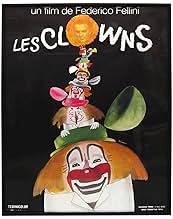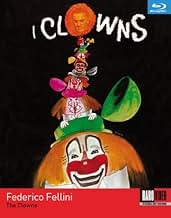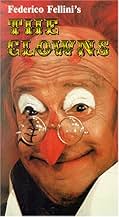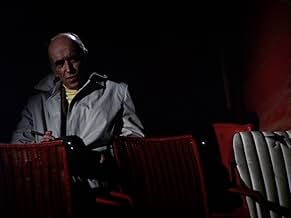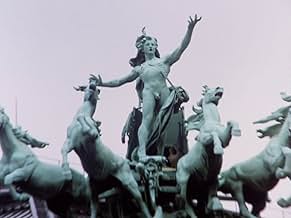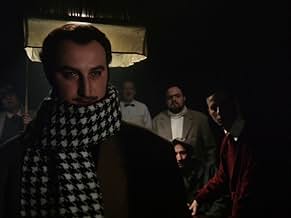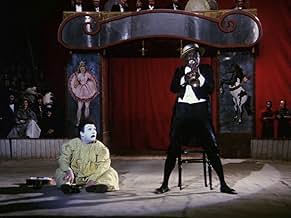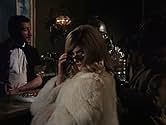IMDb-BEWERTUNG
7,0/10
3171
IHRE BEWERTUNG
Füge eine Handlung in deiner Sprache hinzuA ragout of real memories and mockumentary, as Fellini explores a childhood obsession: circus clowns.A ragout of real memories and mockumentary, as Fellini explores a childhood obsession: circus clowns.A ragout of real memories and mockumentary, as Fellini explores a childhood obsession: circus clowns.
- Regie
- Drehbuch
- Hauptbesetzung
- Auszeichnungen
- 4 Gewinne & 2 Nominierungen insgesamt
Riccardo Billi
- Clown
- (as Billi)
Gigi Reder
- Clown
- (as Reder)
Tino Scotti
- Clown
- (as Scotti)
Carlo Rizzo
- Clown
- (as Rizzo)
Alberto Colombaioni
- Clown
- (as I 4 Colombaioni)
Giacomo Furia
- Clown
- (as Furia)
Dante Maggio
- Clown
- (as Maggio)
Galliano Sbarra
- Clown
- (as Sbarra)
Peppino Janigro
- Clown
- (as Janigro)
Nino Terzo
- Clown
- (as Terzo)
Osiride Pevarello
- Clown
- (as Peverello)
Empfohlene Bewertungen
I was going to skip this one in my survey of Fellini films, but then I read the littlest bit about it and realized that I needed to watch it. It fit far too well into Fellini's thematic wheelhouse and sounded like it carried some of his later stylistic choices in their earliest phase (notably including himself as a sort of character). So, after some searching, I did find a copy with English subtitles, and I'm actually quite glad that I watched it. It's far from one of his best works, but it's warmly endearing towards its subject and carries the same kind of infectious energy that the best of Fellini's later works were filled with so easily.
It's called the first mockumentary, but I Clowns (pronounced like the English E, not the English I) exists somewhere in between genres and never really rests comfortably in one or another, much like Fellini's imagination seemed to operate. It is uninterested in being a straight narrative, a documentary, or even a purely surrealistic expression. Instead it exists in all three realms at once with Fellini spinning them like plates in a circus act.
So, the story that is there is that the character of Fellini (played by himself) is interviewing retired circus clowns to record some kind of oral history of the dying art form, but the movie actually begins with a staged sequence of Fellini as a child watching a circus tent rise from his bedroom window. He sees the show and cries out of fear when the clowns come to the ring and perform their feats. This is the only time that Fellini explicitly relates a personal emotion towards clowns, fear, but here he is as an adult making a movie about them and their history. The movie gets peppered with similar dramatic moments full of Fellini's familiar handling of camera, costuming, and performance as he recounts people from his old town of Remini that he considers to be clowns, or dramatizing stories from clowns about the past.
What ties them together is Fellini going around Europe with his crew, his script girl summarizing things directly into the camera while taking direction from Fellini himself, as they find the retired clowns of famous European circuses. Now, this is the part of the film that feels the most "real", but I'm never quite willing to believe that any of it is actually real, that the people he's interviewing were ever clowns at all. That blurring of the lines between reality and cinema seems to be the point, which is an interesting development for a director whose previous few movies have embraced theatrical affectation over strict reality. In these interviews, we receive a brief lesson on the tradition of specific clown acts with a lot of name dropping about this performer did it this way and that performer did it that way.
The movie's final major section shows a clown funeral done in the large center ring with a bevy of clowns performing their stage-managed bouts of sadness in extended detail. This is like the centerpiece of an actual clown act in a real circus, and it ends up feeling like an elegy for a bygone era. There had been talk and heavy implication of the idea that clowning was a dying form from the interviewees, and here we get a funeral for a specific clown done by clowns themselves. The act is an extravagant one that includes men dressed as horses, a large carriage, a sock gag on the corpse's foot, and a lot of chaos including cannons. It's to note that Fellini is in this scene and he just quietly sits behind the camera giving the very occasional direction, but I have to imagine that he was, in every shot he did not appear, giddy with joy as he watched the chaos unfold. The tender affection for the form and those who performed it is tangible and it all unfolds in signature Fellini style.
I do find the overall picture entertaining, but I do wonder what a more straightforward take on the history of clowning might show. As it stands, I can't believe any of the history told, feeling like the "narrator" is completely unreliable and that the whole show is a form of clowning with the audience as the joke. Still, if I'm to be the butt of this little joke, I'm okay with it. At least I laughed along the way.
It's called the first mockumentary, but I Clowns (pronounced like the English E, not the English I) exists somewhere in between genres and never really rests comfortably in one or another, much like Fellini's imagination seemed to operate. It is uninterested in being a straight narrative, a documentary, or even a purely surrealistic expression. Instead it exists in all three realms at once with Fellini spinning them like plates in a circus act.
So, the story that is there is that the character of Fellini (played by himself) is interviewing retired circus clowns to record some kind of oral history of the dying art form, but the movie actually begins with a staged sequence of Fellini as a child watching a circus tent rise from his bedroom window. He sees the show and cries out of fear when the clowns come to the ring and perform their feats. This is the only time that Fellini explicitly relates a personal emotion towards clowns, fear, but here he is as an adult making a movie about them and their history. The movie gets peppered with similar dramatic moments full of Fellini's familiar handling of camera, costuming, and performance as he recounts people from his old town of Remini that he considers to be clowns, or dramatizing stories from clowns about the past.
What ties them together is Fellini going around Europe with his crew, his script girl summarizing things directly into the camera while taking direction from Fellini himself, as they find the retired clowns of famous European circuses. Now, this is the part of the film that feels the most "real", but I'm never quite willing to believe that any of it is actually real, that the people he's interviewing were ever clowns at all. That blurring of the lines between reality and cinema seems to be the point, which is an interesting development for a director whose previous few movies have embraced theatrical affectation over strict reality. In these interviews, we receive a brief lesson on the tradition of specific clown acts with a lot of name dropping about this performer did it this way and that performer did it that way.
The movie's final major section shows a clown funeral done in the large center ring with a bevy of clowns performing their stage-managed bouts of sadness in extended detail. This is like the centerpiece of an actual clown act in a real circus, and it ends up feeling like an elegy for a bygone era. There had been talk and heavy implication of the idea that clowning was a dying form from the interviewees, and here we get a funeral for a specific clown done by clowns themselves. The act is an extravagant one that includes men dressed as horses, a large carriage, a sock gag on the corpse's foot, and a lot of chaos including cannons. It's to note that Fellini is in this scene and he just quietly sits behind the camera giving the very occasional direction, but I have to imagine that he was, in every shot he did not appear, giddy with joy as he watched the chaos unfold. The tender affection for the form and those who performed it is tangible and it all unfolds in signature Fellini style.
I do find the overall picture entertaining, but I do wonder what a more straightforward take on the history of clowning might show. As it stands, I can't believe any of the history told, feeling like the "narrator" is completely unreliable and that the whole show is a form of clowning with the audience as the joke. Still, if I'm to be the butt of this little joke, I'm okay with it. At least I laughed along the way.
As a great admirer of Federico Fellini, I was really taken with I Clowns. It is not one of Fellini's finest like La Dolce Vita, 8 1/2, Amarcord, Nights in Cabiria and La Strada, but has much to recommend it. I did feel at times that some of the dialogue collided into another bit of dialogue a little too much. And while certainly not amateurish at any rate I can think of other Fellini films better in this good, again not bad, actually it is skilled but with a somewhat grainy quality and lacking the dream-like feel of for instance 8 1/2. Faults aside, the costumes are stunning showing a lot of detail, while the settings are just as colourful. Nino Rota's scoring, which is largely made up of parts of his other works, is bright and cheerful, yet doesn't in any way undermine the melancholic ending. The structure of the story is much more focused than Satyricon, and while I did enjoy the documentary-like approach of some scenes, it was the personal and nostalgic charm that is part of Fellini's style all over that made I Clowns so intriguing. The clowns are interesting with more than them that meets the eye, they are not as easy to identify with as some of Fellini's other work but they are hardly detached either. The acting is engaging at feels at least naturalistic. All in all, largely successful and well done if not among Fellini's finest work. 8/10 Bethany Cox
10EdgarST
A sentimental journey shot in France and Italy, searching the trace of the great clowns of yesterday, by one of the few filmmakers that showed his love for these performers in his own films, an affection that dates from a childhood experience in his hometown Rimini, which is lovingly recreated in the dream-like opening scene. Made for Italian television, the film shows Fellini meeting a few survivors, talking to clowns' relatives and friends, visiting white clowns, and recreating the style of the old art, as the funeral of a famous clown, that closes the documentary. He even finds and films Anita Ekberg, the star of his 1960 masterpiece, "La dolce vita" (I always thought he saw her a bit as a joke); but what I find curious is that his film crew seems to be integrated by a clownish crowd without make-up. Nino Rota contributed one of his most cheerful scores.
The Clowns might be the most wonderfully experimental of the obscure Federico Fellini films. Now depressingly only available on shoddy old videos from the 1980s (where, unintentionally on Fellini's part, the film skips a couple of times in jump cuts), it remains a testament to one of the director's life-long obsessions: the depravity, the joy, the delirium, and the choreography of the circus, particularly clowns in this case.
He opens the film with a particular image- a child watches outside his window as the circus tent is erected up, as if it were rising up from the ground like a tree- and then goes head-first into a circus performance. While it shouldn't be very funny, somehow it is, extremely so, in all the silliest ways that are partly Fellini in the timing of the shots and how buoyant the camera goes, and in the Nino Rota score (which, by the way, borrows from all the standards of circus fare, and as self-referentiality is the name of the game from 8 1/2 in the Wagner choice), and partly from the clowns themselves.
After a quick kaleidoscope view of a neighborhood with certain citizens, like a pool-hall man who's kind except for when he goes into a crazy state once in a while and acts like he's in war, Fellini changes gears, though not exactly. Like Herzog, and just as personally, we see a form of a documentary take shape, and not really at the same time. Fellini seems to be making a documentary on clowns, the history of them, interviews with the old masters from France and Italy and Germany, and visiting what remains of the great old sites and rare silent film reels. But then we see the camera is shooting *them* (them being the crew) shooting the documentary, and not in a usual documentary way: it's still a 'Fellini' film, meaning it has the self-indulgence of Fellini's narration, the dialog sometimes colliding into what the last person said, and in sweet gliding camera movements that seem to be flying on air.
What happens from this is that what could be just sheer indulgent flair turns into a creatively self-conscious work of personal film-making; we all know how wrapped up Fellini is in all of this, and without calling too much attention to it he's relaxed and humorous about it. See the great moment, in the midst of the climax, when he cuts to himself, being interviewed by some journalist, asked what is the 'message' he wants to convey with this film, and immediately after this buckets fall on Fellini and the journalists' heads. And as Fellini is technically doing a documentary, we get a superb whirlwind of showing and telling on the part of the clowns. We see them at how they work, with tigers and with big props, the midgets, the eternal pranksters, and how they look back on their times (one says he just can't look back anymore).
But what's most brilliant is how Fellini kind of answers his own hypothesis, which he comes to after viewing an all-too-short silent film of the clown Remy- that the circus is dead- by having a twenty-five minute long sequence where clowns deal with death, the widows, the resurrection, and just pure celebration. By the time it reaches its apex we're in the midst of one of the grandest of Fellini's orchestrated acts of abstract art, where clowns are running amok, the 'special effects' are going to a point (won't that 'horse' get in place!), and Rota's music seems to be going so fast one might see him off-screen with Fellini as his hands are on fire.
So why not a masterpiece? It is, in a sense, great more as a minor work than as something towering in the cinematic consciousness like La Dolce Vita or 8 1/2. It's also a little difficult to judge it as it now stands in its deteriorated state, as ten seconds of film in different spots seems to be jettisoned. But it is essential viewing for any Fellini fan, and for anyone who loves the circus as much as he does. And for someone like myself, who occasionally finds clowns a little too creepy and wacky for their own good, Fellini's contribution, however brief it is in 93 minutes, is unequivocal.
He opens the film with a particular image- a child watches outside his window as the circus tent is erected up, as if it were rising up from the ground like a tree- and then goes head-first into a circus performance. While it shouldn't be very funny, somehow it is, extremely so, in all the silliest ways that are partly Fellini in the timing of the shots and how buoyant the camera goes, and in the Nino Rota score (which, by the way, borrows from all the standards of circus fare, and as self-referentiality is the name of the game from 8 1/2 in the Wagner choice), and partly from the clowns themselves.
After a quick kaleidoscope view of a neighborhood with certain citizens, like a pool-hall man who's kind except for when he goes into a crazy state once in a while and acts like he's in war, Fellini changes gears, though not exactly. Like Herzog, and just as personally, we see a form of a documentary take shape, and not really at the same time. Fellini seems to be making a documentary on clowns, the history of them, interviews with the old masters from France and Italy and Germany, and visiting what remains of the great old sites and rare silent film reels. But then we see the camera is shooting *them* (them being the crew) shooting the documentary, and not in a usual documentary way: it's still a 'Fellini' film, meaning it has the self-indulgence of Fellini's narration, the dialog sometimes colliding into what the last person said, and in sweet gliding camera movements that seem to be flying on air.
What happens from this is that what could be just sheer indulgent flair turns into a creatively self-conscious work of personal film-making; we all know how wrapped up Fellini is in all of this, and without calling too much attention to it he's relaxed and humorous about it. See the great moment, in the midst of the climax, when he cuts to himself, being interviewed by some journalist, asked what is the 'message' he wants to convey with this film, and immediately after this buckets fall on Fellini and the journalists' heads. And as Fellini is technically doing a documentary, we get a superb whirlwind of showing and telling on the part of the clowns. We see them at how they work, with tigers and with big props, the midgets, the eternal pranksters, and how they look back on their times (one says he just can't look back anymore).
But what's most brilliant is how Fellini kind of answers his own hypothesis, which he comes to after viewing an all-too-short silent film of the clown Remy- that the circus is dead- by having a twenty-five minute long sequence where clowns deal with death, the widows, the resurrection, and just pure celebration. By the time it reaches its apex we're in the midst of one of the grandest of Fellini's orchestrated acts of abstract art, where clowns are running amok, the 'special effects' are going to a point (won't that 'horse' get in place!), and Rota's music seems to be going so fast one might see him off-screen with Fellini as his hands are on fire.
So why not a masterpiece? It is, in a sense, great more as a minor work than as something towering in the cinematic consciousness like La Dolce Vita or 8 1/2. It's also a little difficult to judge it as it now stands in its deteriorated state, as ten seconds of film in different spots seems to be jettisoned. But it is essential viewing for any Fellini fan, and for anyone who loves the circus as much as he does. And for someone like myself, who occasionally finds clowns a little too creepy and wacky for their own good, Fellini's contribution, however brief it is in 93 minutes, is unequivocal.
This little film tends to stand quietly in the shadows of the great director's other works. It cannot compare to 8 1/2, or La Dolce Vita, but it carries a remarkable quality to it that isn't quite like his other films.
Fellini's circus theme is used here to a remarkable effect. There is a sadness that creeps in and around the film, like a cat watching a canary. It is unlike his other works, not as daring or bold, but worth some consideration.
Fellini's circus theme is used here to a remarkable effect. There is a sadness that creeps in and around the film, like a cat watching a canary. It is unlike his other works, not as daring or bold, but worth some consideration.
Wusstest du schon
- WissenswertesThis film has a 100% rating based on 19 critic reviews on Rotten Tomatoes.
- VerbindungenEdited into Circo Fellini (2011)
Top-Auswahl
Melde dich zum Bewerten an und greife auf die Watchlist für personalisierte Empfehlungen zu.
Details
Box Office
- Weltweiter Bruttoertrag
- 284 $
- Laufzeit
- 1 Std. 32 Min.(92 min)
- Sound-Mix
- Seitenverhältnis
- 1.33 : 1
Zu dieser Seite beitragen
Bearbeitung vorschlagen oder fehlenden Inhalt hinzufügen

